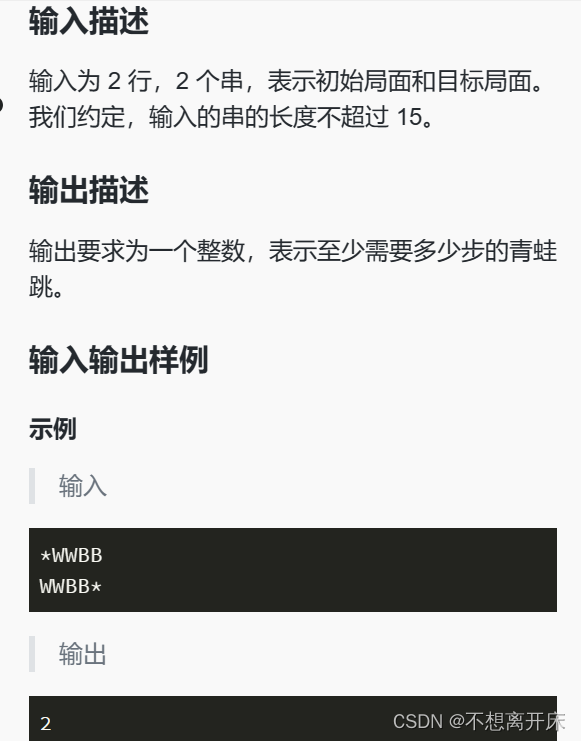本文主要是介绍青蛙跳杯子【蓝桥杯】/bfs,希望对大家解决编程问题提供一定的参考价值,需要的开发者们随着小编来一起学习吧!
青蛙跳杯子



bfs
思路:刚开始用的是dfs,但是不太行,DFS 可能会导致搜索深度过深,增加了时间复杂度,BFS 适合求解最短路径问题,BFS 在搜索过程中,首先访问距离初始节点最近的节点,因此可以保证找到的路径是最短的,所以应该选择bfs。
本题可以以*为切入点,来进行跳跃
#include<iostream>
#include<cmath>
#include<queue>
#include<algorithm>
#include<cstring>
#include<map>
using namespace std;
typedef long long ll;
string s1,s2;
//需要用这个来存储一个串如果已经被访问过就不用再跳了,不然会重复很多
map<string,bool> m;
ll bfs(int n)
{queue<pair<string,ll>> q;q.push({s1,0});while(!q.empty()){string s=q.front().first;//代表步数ll num=q.front().second;q.pop();if(s==s2) return num;if(m[s]) continue;m[s]=1;int idx=s.find('*');string temp;//交换左边第一个if(idx>0){temp=s;swap(temp[idx],temp[idx-1]);q.push({temp,num+1});}//交换左边第二个if(idx>1){temp=s;swap(temp[idx],temp[idx-2]);q.push({temp,num+1});}//交换左边第三个if(idx>2){temp=s;swap(temp[idx],temp[idx-3]);q.push({temp,num+1});}//交换右边第一个if(idx<n-1){temp=s;swap(temp[idx],temp[idx+1]);q.push({temp,num+1});}//交换右边第二个if(idx<n-2){temp=s;swap(temp[idx],temp[idx+2]);q.push({temp,num+1});}//交换右边第三个if(idx<n-3){temp=s;swap(temp[idx],temp[idx+3]);q.push({temp,num+1});}}return -1;
}
int main()
{cin>>s1>>s2;int n=s1.size();cout<<bfs(n)<<endl;return 0;
}
这篇关于青蛙跳杯子【蓝桥杯】/bfs的文章就介绍到这儿,希望我们推荐的文章对编程师们有所帮助!




